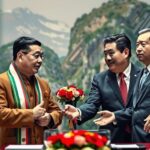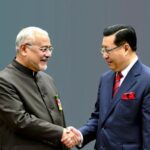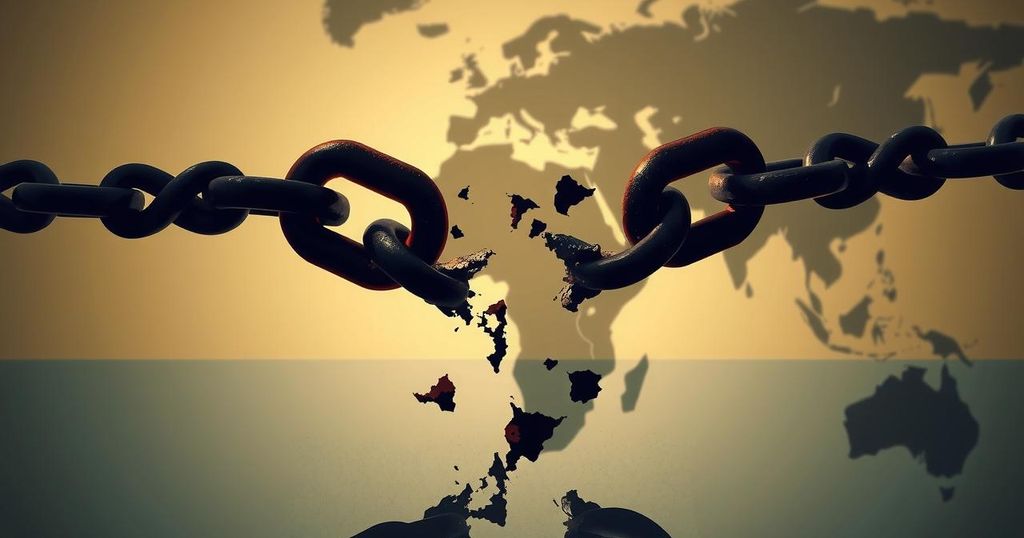Politics
AR, ARZU RANA DEUBA, ASIA, BEIJING, CHINA, COMMUNIST PARTY OF NEPAL - UNIFIED MARXIST LENINIST, CPN, CPN - UML, DIPLOMACY, FOREIGN POLICY, INDIA, INTERNATIONAL RELATIONS, KATHMANDU, KHADGA PRASAD OLI, MARXIST, NEPAL, NEW DELHI, OL, OLI, STRATEGIC PARTNERSHIP, TIBET, UNIFIED, XI
Clara Montgomery
Navigating Diplomacy: PM Oli’s Strategic China Visit for Nepal
Nepal’s Prime Minister Khadga Prasad Oli successfully navigated a complex diplomatic landscape during his recent visit to China, securing a Framework for Belt and Road Initiative Cooperation. The agreement emphasizes case-by-case negotiations for project development while maintaining a careful balance between Nepal’s ties with China, India, and domestic political factions. The visit marks a significant step in Nepal’s efforts to manage geopolitical tensions and foster economic development through enhanced cooperation with China.
Nepal’s Prime Minister Khadga Prasad Oli recently embarked on a significant diplomatic visit to China from December 2-5. During this trip, he successfully balanced various geopolitical tensions, securing a satisfactory agreement amid complex internal and external political landscapes. One of the key resolutions was the signing of the Framework for Belt and Road Initiative (BRI) Cooperation. Rather than committing to a broad implementation plan, the agreement allows for negotiations on individual projects, showcasing Nepal’s strategic maneuvering in its relations with both China and India.
Despite inherent challenges, PM Oli’s negotiations yielded positive outcomes for both nations, as emphasized in a joint statement reinforcing the importance of their bilateral ties. Historically, Nepal’s communist parties have favored relations with China, yet Oli skilfully sidestepped agreements that could lead to political backlash domestically. The framework was crafted through a joint task force involving representatives from Oli’s party and the opposition Nepali Congress, highlighting a united front in pursuing economic development without alienating key stakeholders.
Geopolitically, Oli’s administration reaffirmed its commitment to China’s national interests, specifically regarding Tibet and Taiwan, thus aligning closely with Beijing’s perspectives. The visit led to agreements on major development projects and the revitalization of trade routes that had been hindered by the pandemic. Additionally, the discussions included the potential for enhancing civil aviation ties, essential for improving Nepal’s internal connectivity and tourism.
However, Nepal’s position on BRI financing remains cautious, with an emphasis on receiving grants instead of loans, following a dominant political narrative within the country. The importance of balancing relations with regional powers, particularly India and the United States, while seeking advantage from China’s economic capabilities underlines the delicate diplomatic landscape Nepal navigates. The cooperative effort of the joint taskforce represents a successful model of bipartisan engagement in Nepal’s foreign policy.
As Nepal moves forward, the groundwork laid during this visit will be pivotal in determining future relations not only with China but also with India, particularly as Minister Arzu Rana Deuba is set to visit New Delhi in the coming weeks, with further diplomatic discussions anticipated.
The diplomatic relationship between Nepal and its larger neighbors, India and China, has historically been fraught with complexity. Amidst domestic political upheaval and external pressures, Nepal’s leaders must carefully navigate foreign policy decisions that affect national sovereignty and economic development. China has emerged as a significant partner through initiatives like the Belt and Road Initiative, which aims to enhance infrastructure and connectivity. However, Nepal remains mindful of its close ties with India and the United States, leading to a need for a balanced and prudent approach in foreign affairs.
In conclusion, Prime Minister Oli’s recent visit to China demonstrated adept diplomacy in managing Nepal’s relationships with both regional giants. By strategically engaging in the BRI framework while ensuring bipartisan consensus at home, Nepal positions itself to benefit economically and politically. As further visits to New Delhi approach, maintaining this balance will be crucial for Nepal’s foreign policy moving forward. The collaborative efforts within the joint taskforce signal a new era of diplomatic engagement in which Nepal can assert its agency amidst competing influences.
Original Source: www.hindustantimes.com








Post Comment